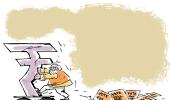India's foreign exchange reserves continue to be comfortably placed in excess of 400 billion dollars and the current account deficit is within manageable levels, Finance Minister Nirmala Sitharaman said on Thursday while tabling the Economic Survey 2018-19 in Parliament.

Although the CAD increased to 2.1 per cent of GDP in 2018-19 due to a rise in crude oil prices, up from 1.8 per cent in 2017-18, it is within manageable levels, she said.
The widening of the CAD has been driven by a deterioration in the trade deficit from 6 per cent of GDP in 2017-18 to 6.7 per cent in 2018-19. Acceleration in the growth of remittances has, however, prevented a larger deterioration of CAD, said the survey.
In funding the CAD, the total liabilities-to-GDP ratio, inclusive of both debt and non-debt components, declined from 43 per cent in 2015 to about 38 per cent at end of 2018.
Besides, the share of foreign direct investment has risen and that of net portfolio investment fallen in total liabilities, thereby reflecting a transition to more stable sources of funding CAD.
In sum, although the CAD to GDP ratio has increased in 2018-19, the external indebtedness continues to be on a declining path.
The Survey said India's foreign exchange reserves continue to be comfortably placed in excess of 400 billion dollars. The rupee traded in the range of 65 to 68 per dollar in 2017-18 but depreciated to 70 to 74 in 2018-19.
The exchange rate in 2018-19 has been more volatile than in the previous year, mainly due to volatility in crude prices, but not much due to net portfolio flows. The real effective exchange rate also depreciated in 2018-19, making India's exports potentially more competitive.
The income terms of trade, a metric that measures the purchasing power to import, has been on a rising trend, possibly because the growth of crude prices has still not exceeded the growth of India's export prices.
India's external debt was 521.1 billion dollars at end-December 2018, 1.6 per cent billion lower than its level at end-March 2018. The long-term debt declined by 2.4 per cent to 417.3 billion dollars at end-December 2018 over end-March 2018, though its share was mostly same at 80.1 per cent of total external debt compared to 80.7 per cent during the same period.
The composition of India's exports and import basket has, by and large, remained unchanged in 2018-19 over 2017-18. India's merchandise exports stood at 330.07 billion dollars in the year 2018-19. Petroleum products, precious stones, drug formulations, gold, and other precious metals continue to be top export items.
India's imports totalled 514.03 billion dollars during the year 2018-19 and crude petroleum, pearl, precious, semi-precious stones, and gold remained as top import items. The trade deficit was 183.96 billion dollars during the period. India's main trading partners continue to be the United States, China, Hong Kong, the United Arab Emirates, and Saudi Arabia.
$5 trillion economy
India needs to sustain a GDP growth rate of 8 per cent to become a five trillion dollar economy by 2025, the Economic Survey has stated.
Such growth can only be sustained by various cycle of savings, investment and exports, it said.
Tabling the survey document in the Rajya Sabha, Finance Minister Sitharaman said global crude oil prices are expected to decline in the current financial year 2019-20.
But India's export prospects remain weak. However, the GDP growth rate for 2019-20 is likely to be 7 per cent on stable macroeconomic conditions.
Sitharaman said accommodative monetary policy is required to help cut real lending rates as investment rate seems to have bottomed out.
The Economic Survey 2018-19 has stressed the need for reducing economic policy uncertainty in the country to promote investment and has recommended the predictability of policies, quarterly monitoring of Economic Policy Uncertainty index and quality certification.
The Survey has stated that higher economic policy uncertainty discourages investment while predictability of policy action and broad consistency in actual policy attract investment. While noting the reduction in economic policy uncertainty in India over the past decade, the Survey has given a set of recommendations to ensure that it stays at low levels in the coming years to ensure growth in investments.
Policy recommendations
The Survey notes that unlike generic economic uncertainty, which cannot be controlled, policymakers can reduce economic policy uncertainty to foster a salutary investment climate in the country. In view of the above, it has made the following recommendations for policy changes.
First, policymakers' must make their actions predictable, provide forward guidance on the stance of policy, and reduce ambiguity/arbitrariness in policy implementation and maintain broad consistency in actual policy.
To ensure predictability, the horizon over which policies will not be changed must be mandatorily specified so that investor can be provided the assurance about future policy certainty. The government could also use labels such as "Standstill" versus "Ratchet up" to categorise various categories of policies according to the level of commitment about future certainty that it can provide.
Second, "what gets measured gets acted upon." So, Economic Policy Uncertainty index must be tracked at the highest level on a quarterly basis. The government must also encourage construction of Economic Policy Uncertainty sub-indices to capture uncertainty stemming from fiscal policy, tax policy, monetary policy, trade policy, and banking policy.
Finally, quality assurance of processes in policy making must be implemented in government via international quality certifications. The adage of "Document what you do, but more critically do what you document!" must be implemented in the government. The process of certification will require training of personnel in following quality assurance processes and will significantly reduce economic policy uncertainty.











 © 2025
© 2025